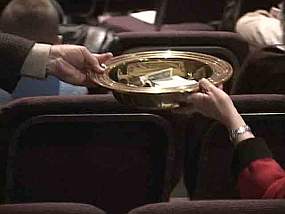Warning: Undefined property: linknotes::$are_links in
/var/www/vhosts/basil/kbsite/blog/wp-content/plugins/linknotes.php on line
73
Theodora (SWMNBN) recently tackled a saddening, maddening topic: Violence in the name of religion.
This excerpt was part of a larger comment that rather called into question the clarity of the commenter’s mind, but it certainly calls for an answer from Christians.
“History is replete with examples of religious leaders and followers advocating, supporting, and participating in blatant evil. Regardless of attempts to shift or deny blame, history clearly records the widespread crimes of Christianity. Whether we’re talking about the abominations of the Inquisition, Crusades, the greed and genocide of colonizers, slavery in the Americas, or the Bush administration’s recent deeds and results, Christianity has always spawned great evil. The deeds of many Muslims and the state of Israel are also prime examples.”
So what is “real” Christianity? Is it the doctrine of Christianity, which is most eloquently expressed in these two simple sentences? “Love the Lord your God and love your neighbor as yourself. Love your enemy and do good to those who harm you.”
Or is it the practice and results of what people do in the name of Christianity, which is, sadly, so viciously described above?
Read the rest: Whispers on Earth: What is Real Christianity?
Although the comment she quotes is from another blog entirely, I can guess that her conversation on this blog about the pope’s recent injuring of Muslim pride has probably remained on her mind, especially the last few comments: Does the Hydra of violence rear its ugly heads in every religion or are some exempt by virtue of their superior doctrinal foundation?
Theodora ends by quoting Richard Feynman: “The keys to heaven and to hell are the same. It’s all in what door you open with them.” This quote is quite similar to the one her post inspired for me, by Alexander (Aleksandr) Solzhenitsyn in The Gulag Archipelago:
If only it were all so simple! If only there were evil people somewhere insidiously committeing evil deeds, and it were necessary only to separate them from the rest of us and destroy them. But the line dividing good and evil cuts through the heart of every human being. And who is willing to destroy a piece of his own heart?
During the life of any heart this line keeps changing place; sometimes it is squeezed one way by exuberant evil and sometimes it shifts to allow enough space for good to flourish. One and the same human being is, at various ages, under various circumstances, a totally different human being. At times he is close to being a devil, at times to sainthood. But his name doesn’t change, and to that name we ascribe the whole lot, good and evil.
I found this quoted at length in a blog article by the “Crunchy Con” Rod Dreher on beliefnet. Dreher quotes more, including Solzhenitsyn’s conclusion that the difference between the evils of the twentieth century and ages past is ideology.
Most major world religions can respond that the essentials of their religions eschew violence and evil of any kind. Even those that do not have modern, liberal advocates who have ingenious ways of explaining why their scriptures do not really advocate violence.
I also think that a malaise of modern, liberal society is tied up in this: There are a growing number of people who do not value freedom precisely as a human right. They accept it, not as an “inalienable” right “endowed by their Creator,” but as a privilege bestowed by the State, which of course has absolute, not limited, sovereignty. They do not believe that our liberal way of life is worth defending with blood, in the same way that it was established, nor do they believe that others deserve it. Or, if they do believe that others are deserving of liberty, they have difficulty believing that there are men in the world bent on destroying freedom.
As a sidebar: There was no ability to comment directly on Theodora’s blog. This brought back the memories of the old days when you commented on someone’s blog by writing a blog article of your own. It was years, in fact, before I even enabled comments here. My attitude, in fact, was: If you want to comment on what I write, get your own blog!


 Listening to this podcast has been very good for me; it is one of the few ways that I am able to connect with the Church in some place other than church. I’ve missed it of late due to a convergence of technical issues and a series of reruns, which I’ve skipped. This morning I listened to the last two weeks back to back.
Listening to this podcast has been very good for me; it is one of the few ways that I am able to connect with the Church in some place other than church. I’ve missed it of late due to a convergence of technical issues and a series of reruns, which I’ve skipped. This morning I listened to the last two weeks back to back.